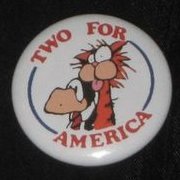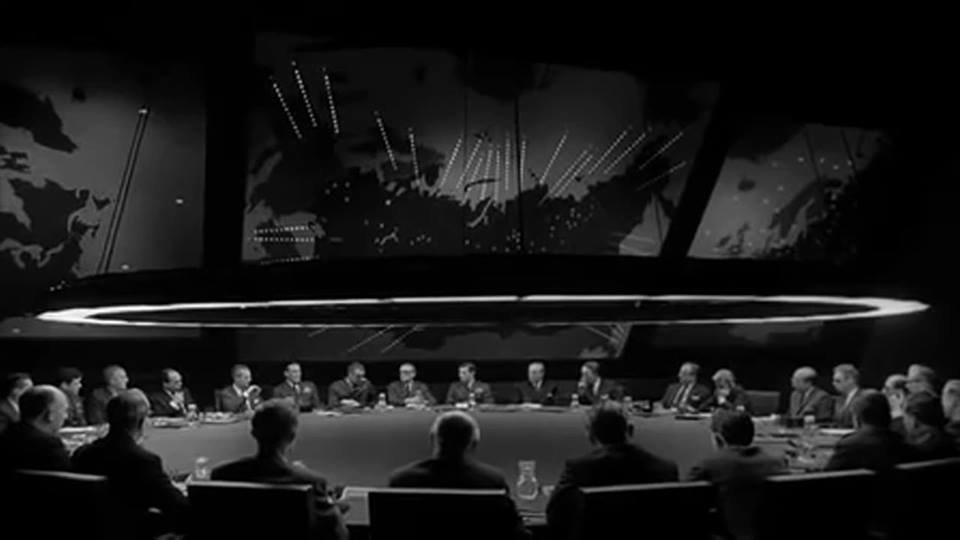-
Posts
1,097 -
Joined
-
Last visited
-
Days Won
1
Content Type
Profiles
Forums
Events
Everything posted by JamesHackerMP
-

Revolution No. 9
JamesHackerMP replied to JamesHackerMP's topic in Federal Politics in the United States
Like the Romans perhaps? -

Revolution No. 9
JamesHackerMP replied to JamesHackerMP's topic in Federal Politics in the United States
It won't start like the Russian Revolution. So maybe you're saying it'll be a coup d'etat instead, perhaps? -
Hypothetical question: What will start the next American Revolution? Will it begin with a coup d'etat? A constitutional convention that gets out of hand? (like the meeting of the French Estates General) Or, as in the "Nika Riots" of Constantinople, the Reds and the Blues unite and overthrow the government out of sheer disgust? The first one began with a middle class (ish) tax revolt. Lots of businessmen (John Hancock) and lawyers (John Adams) with a sprinkling of large landowners-cum-soliders (George Washington). The second was a battle between landowners and industrialists, but it is of course more complicated than that. (I personally hate the states' rights/slavery debate, it bores the hell out of me). Thoughts?
-

Who will run for President in 2020?
JamesHackerMP replied to August1991's topic in Federal Politics in the United States
I think Chester Arthur or maybe James Buchanan was closeted gay, so it won't be a first. Hillary won't run. These days when you lose a general election for President, you're done. Primary, that's OK but the general--you're done in politics (mostly...or at least presidential politics). -
Not familiar with Lee Kuan Yew's accomplisments, except I know he was "prime minister" (more like dictator) of Singapore. Vlad the Impaler--er, President Putin--I agree hasn't done much for his people except look badass to them, I'd agree. I agree that even democratic leaders have to be SOB's some times (at least mean ones), I think it was Voltaire who said governments need both shepherds and butchers.
-
They can be synonymous. The context in which I am using ruler is the same as a political leader. You're getting a little bogged down in the semantics. It's obvious what I mean though, when I say ruler (in fact, I already provided examples above of what I meant, above). If we get bogged down on what the trees look like, we're going to miss the view of the whole forest. And what a pretty view it is! That said however, I agree with your assessment, Argus. Totally. But the problem is, rulers (political leaders, whatever!!!) of some countries didn't win an election, which makes it harder for them to be "good" by our definition. But should we write these rulers [whatever] off simply because they're not democratically elected? Can an absolute or nearly-absolute monarch do good things? After all, their democratically-elected counterparts aren't always shining examples of good government (Dick Nixon, Warren G Harding, etc) However, I'm willing to go out on a limb and bet that absolute rulers are far less likely to be "good" or "virtuous" in their jobs than their democratic confreres. This is of course due to the nature of democracies that have free expression (incl a free press) being better able (though not 100% perfect) at exposing corruption. Maybe democratic rulers/leaders are not necessarily "better" rulers, they just have an easier time looking like better people than dictators because they're working inside a better system? (I might remind you at this point Adolph Hitler was democratically-elected in the Weimar Republic, but that debate could open a whole different can of worms and associated caveats!) The US recently relieved a particular country of its particularly strong dictator, a few years back (let's not mention who or where, lest we get sidetracked yet again). It was seen as a mistake, because some political scientists, and others, believed that that particular country could only be held together by a "strong leader", perhaps even a cruel one. This particular leader was a bastard, but then again, there were no electoral mechanisms in his country to allow him to achieve power through democratic means. (After several military coups between 1958 and 1968, such mechanisms had long since become unavailable.) If you've read The Prince by Niccolo Machiavelli, he makes an interesting discussion on what he thinks a good ruler is. He uses the word "virtu" (not virtue) to mean intelligence, strength and the SKILL of a leader. Not just that he's a "nice guy". In some countries, as I mentioned in the above paragraph, the democratic machinery and political culture just isn't available. So what if you DID rule (or run) a country that was undemocratic. Are you automatically a "bad" leader/ruler where democratic means are unavailable? or is it possible to be at least the best leader possible under the circumstances?
-
That's an important point: "I won the election, the People are behind me, therefore I can do what I want" is a pretty disastrous thing. A good ruler/leader/whatever respects the fact that you have to compromise no matter what, even if you have a majority of the electorate behind you.
-
I think I was pretty clear that leader and ruler can be commensurate. You seem to misunderstand the American system, by the way. The president is answerable to the people, not to Congress. That's how a presidential democracy is wired. I like that we can have a frank and open exchange of views, but can we avoid getting into semantics? I think you already know exactly what I mean. OK I'll humor you: what makes a good elected leader/Prime Minister/President (in a presidential system)/whatever. Is that a little more specific?
-
Agreed! Sometimes the only metric you can abide is "what worked", since politicians can't often (hardly ever) defend their "intentions". No silver medal is awarded in politics for coming in second place! John Adams, in my opinion, was a great president of the United States--but with some exceptions. He didn't get re-elected to the Presidency, likely because he made some principled, unpopular decisions. (Of course, there were many other factors, too, but it doesn't change the fact he gave us a few long-term benefits brought about by principled, unpopular decisions!) I didn't know the abolition of capital punishment in Canada was UNpopular, even at the time! (Wow...)
-
Really? So you wouldn't stoop to putting murderers in prison? (even in the US many states have outlawed the death penalty or commuted death sentences, but still, isn't it cruel to confine people, to strip them of all property and liberty for the rest of their lives? I would agree a murderer deserves to be stripped of all liberty and property, but still, it's a necessary use of cruelty.) Canada participated in World War II (earlier than the United States). Should the British Empire & its dominions have simply let the Axis walk all over the world? The allies subjected Germany/Japan/Italy and their citizens to extreme cruelty, even brutality, but it had to be done to defend our freedom and our lives, right? So what are you going to do, not have a military (and use it in war) because that's cruel?
-
not sure how the last sentence got struck out like that...
-
All right, to prove that I can "figure it out on my own", I'll give you my view. A leader cannot always be "benevolent". When someone commits a murder, or other such infamous crimes, you lock him or her up in prison. That is not benevolent; it is cruel for the State to take away someone's liberty and/or property, to confine them in a little cell the rest of their life. But that cruelty is necessary to prevent their committing acts of cruelty on others in society. So a ruler/leader being "benevolent" all the time is harmful to his subjects/fellow citizens. Machiavelli cites an example of how a cruel ruler, Cesare Borgia, restored peace and happiness to the Romagna, while the Florentine Republic harmed the citizens of Pisa by refraining from showing a heavy hand during protests that harmed its citizens. This is not to say that a ruler should go too far, and use cruelty willy-nilly on his citizens; wake up in a bad mood and "oh I think I'll clear out the prisons by shooting all the prisoners myself for s**** and grins." Of course not. But sometimes cruelty can be used in appropriate situations whereas benevolence or clemency can be improperly used. A ruler needs to use cruelty as rarely as possible, and as lightly as possible. But if he refrains from using it too much, disorder will persist, and, in the end, he or she will be unable to avoid using it and must use a lot of it and more frequently.
-
There's no need to be sarcastic or patronizing, Eyeball. I was asking how a ruler should be benevolent, not what the definition of "benevolent" is. In other words "could you develop that point?" Also: You ignore the difference between political power and constitutional authority. They're not always commensurate. Also, I can attest to the fact that Canada is a fully-independent nation-state with its own international representation. (There is a Canadian Embassy in Washington for example.) Bermuda, the Caymans, the Falklands, they're all crown colonies. Canada is not.
-
And I would also suggest "1984" by George Orwell. There's a reason they call taking over whole parts of the economy and trying to eliminate money "Orwellian".
-
I've read the first 80 pp of the unabridged version of the Wealth of Nations. Trust me, it should open your eyes to the way markets work, but it is nothing Utopian about it. It's how the real world works.
-
Define "benevolence". I mean, I have a dictionary; but is what is benevolent in the context of a ruler?
-
Mmmmm hmm! But a Canadian citizen told me H.M. reigns and Parliament rules. Both Queen Elizabeth and Mr. Trudeau are leaders; but the former may lead by example at most, the latter by means of actual power. Speaking of those who "rule" my intent was to examine those who have actual power to call the shots, not those who wield authority on paper but no de facto power.
-
Also: what do you mean by that? I do not understand.
-
Are you willing to run? I'd take anybody over the current crop of candidates, at this point. Yes, with logic rather than emotions: that's a good point. A lot of leaders do what "feels good" for a particular group of people they hope will vote for them, especially at the moment, rather than what is in the long-term interests of those people.
-
Definitely more of a philosophical thread, this is. So: what makes a ruler good? By what metrics do we measure him/her? There are lots of different standards of political philosophy. I was curious what Canadians (and others) seem to think about this one.
-

How Christians reconcile supporting the devil
JamesHackerMP replied to Argus's topic in Religion & Politics
Whoever said "died a virgin v. grabs a pussy" just made me pee myself laughing so hard. -

Disunion of the States: AmExit
JamesHackerMP replied to August1991's topic in Federal Politics in the United States
Agreed. People look at the President and think that's all there is, or that he's the most powerful entity within the entire system. That's false: the president is the most powerful individual within the American constitution but as an entity, the White House/Presidency has plenty of competition.

